|
|
|
Sort Order |
|
|
|
Items / Page
|
|
|
|
|
|
|
| Srl | Item |
| 1 |
ID:
116605
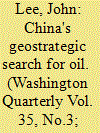

|
|
|
|
|
| Publication |
2012.
|
| Summary/Abstract |
In 2000, Asia analyst Robert A. Manning presciently argued that the likelihood of future conflict over energy resources would increase as rising Asian giants such as China shifted away from an economic toward a strategic approach to energy security.1 Since then, as China's energy consumption has expanded and its rise has become the dominant geopolitical issue of our time, Beijing's energy security policy has become one of the major discussion topics.
|
|
|
|
|
|
|
|
|
|
|
|
|
|
|
|
| 2 |
ID:
116601
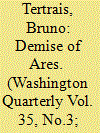

|
|
|
|
|
| Publication |
2012.
|
| Summary/Abstract |
In 1990, U.S. political scientist John Mearsheimer predicted that we would soon "miss the Cold War."1 In the months and years that followed, the eruption of bloody conflicts in the Balkans and in Africa gave birth to fears of a new era of global chaos and anarchy. Authors such as Robert Kaplan and Benjamin Barber spread a pessimistic vision of the world in which new barbarians, liberated from the disciplines of the East-West conflict, would give a free rein to their ancestral hatreds and religious passions.2 Journalists James Dale Davidson and William Rees-Mogg chimed in that violence would reassert itself as the common condition of life.3 Former U.S. Senator Daniel Patrick Moynihan warned that the planet was about to become a "pandemonium."4
|
|
|
|
|
|
|
|
|
|
|
|
|
|
|
|
| 3 |
ID:
116604


|
|
|
|
|
| Publication |
2012.
|
| Summary/Abstract |
Despite all the optimism accompanying the uprisings of 2011, the Arab Middle East remains a stagnant region in deep socio-political crisis with little chance for positive change anytime soon. The current regimes may stay in power or get replaced by new dictatorships, moderate or radical. Either way, in the near future, weak states will continue to grapple with domestic problems and the direction of their foreign policies. For good reason, this situation has Israeli leaders worried about the implications for their country's national security. The changing regional balance of power favors Turkey and Iran, both of whom encourage radical elements in the region, not Israel, while the seeming decline in U.S. clout has negatively affected both the Arab-Israeli peace process and Israel's deterrent power.
|
|
|
|
|
|
|
|
|
|
|
|
|
|
|
|
| 4 |
ID:
116603
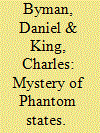

|
|
|
|
|
| Publication |
2012.
|
| Summary/Abstract |
In almost every region of the globe, there is a phantom state hovering like an apparition among the more corporeal members of the international system. Some of their names sound like the warring kingdoms of a fantasy novel: Abkhazia and South Ossetia, Nagorno-Karabakh and the Dniester Moldovan Republic. Others, such as Gaza/Palestine, the Turkish Republic of Northern Cyprus, or Taiwan, dominate the headlines. These polities look like real countries to their inhabitants, who salute their flags and vote in their elections. Some even field armies, issue visas, and collect taxes. But they are largely invisible to international legal institutions, multilateral organizations, and global trade regimes. The reason is that they lack formal recognition, or what a political scientist would call "external sovereignty."
|
|
|
|
|
|
|
|
|
|
|
|
|
|
|
|
| 5 |
ID:
116606
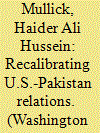

|
|
|
|
|
| Publication |
2012.
|
| Summary/Abstract |
Afghanistan is America's longest war. Thousands of U.S. troops and those from nearly 50 other countries have fought in Afghanistan against Taliban and al-Qaeda forces, but it was in nuclear-armed Pakistan where Osama bin Laden was killed, Khalid Sheikh Mohammad (the mastermind of 9/11) was captured, and Afghan Taliban leader Mullah Omar as well as the heads of the virulent Haqqani network reside. Pakistan's duplicity is a fact, yet it is often excessively characterized as a function of the India-Pakistan rivalry. Pakistani generals do fear India, but they have also recognized the threat from domestic insurgents. The height of this concern was reached in 2009, when the Pakistani Taliban were 60 miles from the country's capital and jeopardized U.S. as well as Pakistani goals in the region: interdicting al-Qaeda, protecting Pakistani nuclear weapons, and stabilizing (and in Pakistan's case, an anti-India) Afghanistan. At that point, Pakistani troops, unlike past attempts, fought back and prevailed against the insurgents. It can be done.
|
|
|
|
|
|
|
|
|
|
|
|
|
|
|
|
| 6 |
ID:
116607
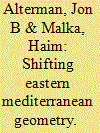

|
|
|
|
|
| Publication |
2012.
|
| Summary/Abstract |
The security architecture that the United States helped establish after the Cold War in the Eastern Mediterranean is crumbling. That architecture emphasized two triangular partnerships: U.S.-Turkey-Israel and U.S.-Egypt-Israel. Each had its origin in the Cold War and gained new emphasis afterwards as a cornerstone of U.S. efforts to promote Middle Eastern stability. Yet the evolution of internal politics in Turkey over the last decade, combined with more recent shifts in Egypt, have brought to the fore civilian politicians who are openly critical of such partnerships and who have sidelined the partnerships' military proponents. The demise of these two triangles has profound implications for Israeli security, as well as for the U.S. military and diplomatic role in the Eastern Mediterranean. The changing geometry of U.S. relationships in the Eastern Mediterranean is part of a set of broader trends that make it more difficult for the United States to shape outcomes and set agendas in the region. This change in particular is likely to force the United States to emphasize bilateral relationships and ad hoc direct action in the future, placing a greater demand on ongoing U.S. management than has been the case in the past.
|
|
|
|
|
|
|
|
|
|
|
|
|
|
|
|
| 7 |
ID:
116610


|
|
|
|
|
| Publication |
2012.
|
| Summary/Abstract |
Turkey's view concerning its commitment to NATO is changing. NATO has always been the most prestigious institution binding Turkey to the West, but Turks are beginning to question whether NATO is still indispensable to Turkey's foreign and security policies. During the Cold War, Turkey's commitment to NATO was largely identity-driven.1 Membership in NATO suited Turkey's goal of pursuing a Western/European identity, and was justified by the Westernization goals of the founders of the Republic. Even though NATO's primary purpose at its inception was to help secure the territorial integrity of its members against the Soviet Union, the Alliance also symbolized the unity of nations which embrace liberal-democratic norms at home and abroad; it offered a security blanket under which European allies could intensify their supranational integration process and turn Europe into a Kantian security community.2 Joining NATO in 1952 was therefore a logical follow-up step to Turkey's membership in the Council of Europe (1949), and helped Turkey legitimize the claim that it was a Western/European country, representing the Western international community in the Eastern Mediterranean.
|
|
|
|
|
|
|
|
|
|
|
|
|
|
|
|
| 8 |
ID:
116609


|
|
|
|
|
| Publication |
2012.
|
| Summary/Abstract |
In May 2010, while the United States and other Western powers in the UN Security Council were drafting a resolution on further sanctions to pressure Iran over its controversial nuclear program, Turkey and Brazil-then non-permanent members of the Security Council-announced a fuel-swap deal with Iran. The Tehran Declaration, as it was called, stipulated that 20-percent-enriched nuclear fuel was to be provided to Iran for its use in the Tehran Research Reactor, which produces medical isotopes, in exchange for the removal of 1,200 kilograms of 3.5-percent-low-enriched uranium (LEU) to Turkey.1 Initial reactions to the deal varied, but there was fear that the 20-percent-enriched fuel would enable Iran to further enrich uranium and attain the level necessary to construct a nuclear weapon more rapidly.2
|
|
|
|
|
|
|
|
|
|
|
|
|
|
|
|
| 9 |
ID:
116608
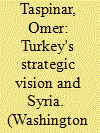

|
|
|
|
|
| Publication |
2012.
|
| Summary/Abstract |
For most of the 20th century, Turkey chose not to get involved in Middle Eastern affairs. During the past decade, however, in a remarkable departure from this Kemalist tradition (based on the ideology of the republic's founder, Mustafa Kemal Atatürk), Ankara has become a very active and important player in the region. Under the Justice and Development Party (AKP) government since 2002, Turkey has established closer ties with Syria, Iran, and Iraq, assumed a leadership position in the Organization of the Islamic Conference (OIC), attended Arab League conferences, and contributed to UN forces in Lebanon. It has also mediated in the Syrian-Israeli conflict as well as the nuclear standoff with Iran. Ankara's diplomatic engagements with Iran and Hamas have led to differences with the United States and Israel, leaving many wondering if Turkey has been turning away from its Western orientation or if it was just a long overdue shift East to complete Turkey's full circle of relations.
|
|
|
|
|
|
|
|
|
|
|
|
|
|
|
|
| 10 |
ID:
116602
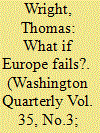

|
|
|
|
|
| Publication |
2012.
|
| Summary/Abstract |
The European Union is engaged in a ferocious political, diplomatic, and economic struggle to preserve the future of the single currency, the Euro, and the viability of what has become known simply as "the project," namely the process of integration that has been the bedrock of Western European politics for over half a century. It is distinctly possible that its members' efforts may fail, either in the short or long term, and give way to an era of disintegration. Some have sounded the alarm: German Chancellor Angela Merkel famously remarked, "If the Euro fails, Europe fails."1 Former president Nicolas Sarkozy of France predicted, "If the euro explodes, Europe would explode. It's the guarantee of peace in a continent where there were terrible wars."2 Polish Foreign Minister Radek Sikorski warned the Euro's collapse could cause an "apocalyptic" crisis.3 Harvard economist Dani Rodrik cautioned "the nightmare scenario would … be a 1930's-style victory for political extremism." After all, "fascism, Nazism, and communism were children of a backlash against globalization."4 The erosion of democracy in Hungary and the rise in support for populist parties in Greece, the Netherlands, Finland, and France appears to some to be the beginning of the end.
|
|
|
|
|
|
|
|
|
|
|
|
|
|
|
|
|
|
|
|
|